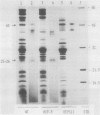Abstract
Use of the octyl β-d-glucopyranoside solubilization procedure of Camm and Green (1980 Plant Physiol 66: 428-432) reveals that thylakoid membranes of a photosystem (PS) II-deficient maize (Zea mays L.) mutant lack two chlorophyll protein (CP) complexes associated with PSII, i.e. CPa-1 and CPa-2. In contrast, when lithium dodecyl sulfate is used to solubilize the membranes of the mutant prior to electrophoretic separation, a CP complex is observed which has a mobility similar to that of CPa-2. Comparison of spectral characteristics and polypeptide composition of the green bands in this region taken from samples of the mutant, normal sibling control plants and from PSII preparations indicate that the CP complex observed in the mutant represents a portion of a light-harvesting complex of PSI (Mullet et al. 1980 Plant Physiol 65: 814-822). The green band observed in normal maize samples can contain both the CPa-2 complex as well as the CP complex derived from the PSI antennae system.
Full text
PDF



Images in this article
Selected References
These references are in PubMed. This may not be the complete list of references from this article.
- Camm E. L., Green B. R. Fractionation of Thylakoid Membranes with the Nonionic Detergent Octyl-beta-d-glucopyranoside: RESOLUTION OF CHLOROPHYLL-PROTEIN COMPLEX II INTO TWO CHLOROPHYLL-PROTEIN COMPLEXES. Plant Physiol. 1980 Sep;66(3):428–432. doi: 10.1104/pp.66.3.428. [DOI] [PMC free article] [PubMed] [Google Scholar]
- Camm E. L., Green B. R. Widespread distribution of some minor chlorophyll-protein complexes in some plants and algae. Plant Physiol. 1981 May;67(5):1061–1063. doi: 10.1104/pp.67.5.1061. [DOI] [PMC free article] [PubMed] [Google Scholar]
- Henriques F., Park R. B. Spectral characterization of five chlorophyll-protein complexes. Plant Physiol. 1978 Dec;62(6):856–860. doi: 10.1104/pp.62.6.856. [DOI] [PMC free article] [PubMed] [Google Scholar]
- Leto K. J., Keresztes A., Arntzen C. J. Nuclear Involvement in the Appearance of a Chloroplast-Encoded 32,000 Dalton Thylakoid Membrane Polypeptide Integral to the Photosystem II Complex. Plant Physiol. 1982 Jun;69(6):1450–1458. doi: 10.1104/pp.69.6.1450. [DOI] [PMC free article] [PubMed] [Google Scholar]
- Mullet J. E., Burke J. J., Arntzen C. J. Chlorophyll proteins of photosystem I. Plant Physiol. 1980 May;65(5):814–822. doi: 10.1104/pp.65.5.814. [DOI] [PMC free article] [PubMed] [Google Scholar]
- Wessels J. S., Borchert M. T. Polypeptide profiles of chlorophyll . protein complexes and thylakoid membranes of spinach chloroplasts. Biochim Biophys Acta. 1978 Jul 6;503(1):78–93. doi: 10.1016/0005-2728(78)90163-9. [DOI] [PubMed] [Google Scholar]




